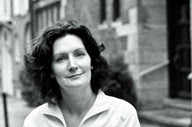At the Central Library, Egan read the first chapter "Found Objects." Sasha is a kleptomaniac out on a date. In the hotel restaurant's bathroom, she discovers an open purse on the floor, a green wallet waiting to be taken. As we follow Sasha through her date and robbery, we travel between this night and sessions with her therapist, Coz.
It began the usual way, in the bathroom of the Lassimo Hotel. Sasha was adjusting her yellow eye shadow in the mirror when she noticed a bag on the floor beside the sink that must have belonged to the woman whose peeing she could faintly hear through the vaultlike door of a toilet stall. Inside the rim of the bag, barely visible, was a wallet made of pale green leather. It was easy for Sasha to recognize, looking back, that the peeing woman's blind trust had provoked her: We live in a city where people will steal the hair off your head if you give them half a chance, but you leave your stuff lying in plain sight and expect it to be waiting for you when you come back? It made her want to teach the woman a lesson. But this wish only camouflaged the deeper feeling Sasha always had: that fat, tender wallet, offering itself to her hand -- it seemed so dull, so life-as-usual to just leave it there rather than seize the moment, accept the challenge, take the leap, fly the coop, throw caution to the wind, live dangerously ("I get it," Coz, her therapist, said), and take the fucking thing.And that's where the novel began for Egan. With a wallet in the bathroom. One evening she was having dinner with her mother at a hotel restaurant in NYC and went into the bathroom to discover a very vulnerable wallet. Except Egan didn't steal it. At first, she sympathize with the unknowing woman in the bathroom stall, having been the victim of many such crimes. It set her to thinking about what kind of person would be tempted to take it. At this point, Egan was researching a novel about women who worked at the Brooklyn Navy Yard, but she decided that the next morning she would write about this person. That led to Sasha who led to Bernie Salazer who led to a cast of characters who move from the background to the foreground in different stories. (I wonder if we'll ever see that other book.)
Egan sites two inspirations while writing the Goon Squad. Proust for his obsession with time and "The Sopranos" for two reasons. The characters are cliches in public, but are nuanced in private, and the characters go from being peripheral characters in one episode to central characters in another.
So she would follow different characters and explore beyond the cliche. It was an exciting process, complete lawlessness as she hand-wrote story after story. Then she typed them up, printed them out, and developed some self-defined rules. In the end she stuck with three:
- Each piece had to stand on its own. They could not lean on each other; they could only enhance each other.
- The collection had to have an extreme range of tone.
- There could be no overlap in the stories. Each piece had to be unique.
Even though I'm excited to read A Visit from the Goon Squad, I'll have to wait to the fall. Egan's not local, even if she is a graduate of the University of Pennsylvania and confesses that she occasionally tries to convince her husband to move here--unsuccessfully.
Check out her groovy website.






